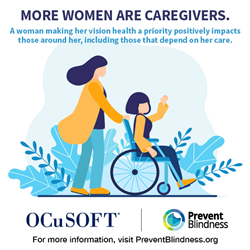
Prevent Blindness declares April as Women’s Eye Health and Safety Month to encourage women to make their vision a priority.
“We encourage women to be a model for good health by making their eyecare a priority today to ensure healthy vision for years to come,” said Kira Baldonado, Vice President of Public Health and Policy at Prevent Blindness.
CHICAGO (PRWEB)
March 29, 2023
Two out of every three people living with blindness or vision problems are women, according to the National Eye Institute. That’s why Prevent Blindness, the nation’s leading nonprofit eye health organization, has declared April as Women’s Eye Health and Safety Month. Because many of the effects of vision loss from eye disease can be lessened if detected and treated early, the group offers a variety of expert-reviewed free resources, including videos, fact sheets and shareable social media graphics on a range of eye health issues. Information on eye safety topics, including contact lenses, cosmetics and ultraviolet (UV) protection is also available.
For some, pregnancy brings an increase in hormones that may cause changes in vision. In most cases, these are temporary eye conditions that will return to normal after delivery. Those with pre-existing eye conditions, such as diabetes, high blood pressure, and glaucoma, should inform their eye doctor of their pregnancy to help monitor their health.
Women who are perimenopausal (nearing menopause) or already in menopause may also experience vision changes. Dry eye occurs at double the rate in postmenopausal women, according to the American Academy of Ophthalmology (AAO).
Women have a higher prevalence of many of the major vision problems, including:
- Age-related Macular Degeneration
- Cataract
- Dry Eye
- Glaucoma
- Refractive Error
- Thyroid Eye Disease
The AAO also states that women are more susceptible to autoimmune diseases than men, many of which affect vision, such as lupus and Sjögren’s syndrome.
As part of the Prevent Blindness Focus on Eye Health Expert Series, Janine Austin Clayton, M.D., FARVO, Associate Director for Research on Women’s Health and Director, Office of Research on Women’s Health at the National Institutes of Health (NIH), shares her thoughts on a variety of women’s eye health issues including equitable access to eyecare, addressing the impact of vision loss on mental health, and more in the new “Women’s Eye Health and Safety” episode.
In regards to eye safety, according to the Centers for Disease Control and Prevention (CDC), two-thirds of the 45 million people in the United States who wear contact lenses are women. Prevent Blindness reminds everyone that a prescription from a qualified eyecare professional is required to legally purchase contact lenses in this country, and to always wear contact lenses under the supervision of an eye doctor. Tips for safely caring for contact lenses may be found at: preventblindness.org/wearing-contact-lenses/
“Women lead incredibly busy and diverse lives- from running companies to running households. It is critical for women to take care of their own health needs, including eye health, to ensure they can be there for others,” said Kira Baldonado, Vice President of Public Health and Policy at Prevent Blindness. “We encourage women to be a model for good health by making their eyecare a priority today to ensure healthy vision for years to come.”
For more information on women’s eye health topics, including fact sheets on eye diseases and eye safety, please visit PreventBlindness.org. Prevent Blindness also offers a free listing of financial assistance services in English and Spanish at: preventblindness.org/vision-care-financial-assistance-information/.
About Prevent Blindness
Founded in 1908, Prevent Blindness is the nation’s leading volunteer eye health and safety organization dedicated to fighting blindness and saving sight. Focused on promoting a continuum of vision care, Prevent Blindness touches the lives of millions of people each year through public and professional education, advocacy, certified vision screening and training, community and patient service programs and research. These services are made possible through the generous support of the American public. Together with a network of affiliates, Prevent Blindness is committed to eliminating preventable blindness in America. For more information, visit us at preventblindness.org, and follow us on Facebook, Twitter, Instagram, LinkedIn and YouTube.
###
Share article on social media or email:

